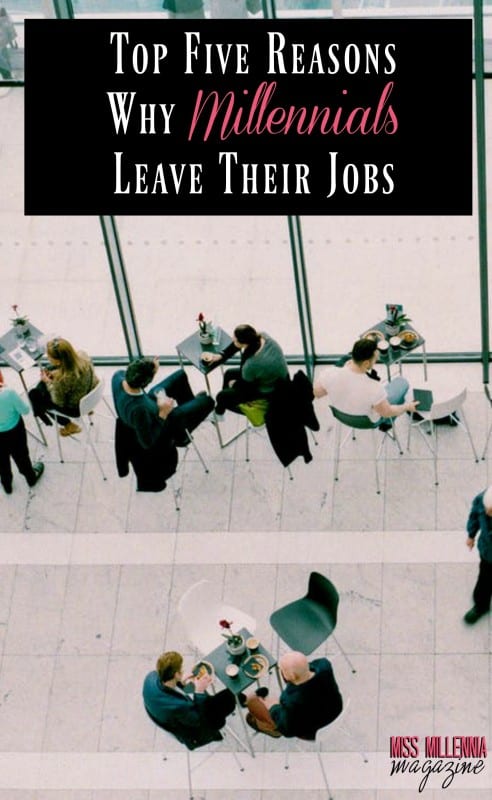The Top Five Reasons Why Millennials Leave Their Jobs
Every generation seems to have a particular work style and considers specific job-related issues more or less critical. For the baby boomers, being attached to the company is essential. Many have stayed with the same job or company for several decades.
Not so millennials, who are much more likely to pick up stakes and move on. For one thing, millennials have often seen their parents downsized, laid off, or fired after years of service, so they have less trust in organizations. A 2016 survey by Deloitte found two-thirds of millennials expected to leave their current jobs by 2020. But millennials leave jobs for a variety of reasons.
So What Do Millennials Look for in a Job?
Each generation tends to look for different things in the workplace. For millennials, Harvard Business Review reports that the top four factors are an opportunity to learn and grow, the manager’s quality, the management’s overall quality, and an interest in the type of work. These are followed by opportunities for advancement and overall compensation. Clear down at the bottom of the list are that the organization encourages creativity, the organization is a fun place to work, and the work environment is informal.
Millennials and Work-Life Balance
Work-life balance is a big issue for millennials. First, this group’s younger members often try to juggle education and a job. Second, millennials are in the prime child-bearing and raising years. They have a greater need for flexibility than a baby boomer or even a Generation-Xer, whose kids are more likely to be near or in their teens. Long hours, inflexible schedules, and a lack of sympathy for all the demands on their time can make them hop off the job to find something that better meets their needs.
Why Millennials Leave Jobs
If you go back to what millennials value in their jobs, it’s not too hard to turn that around and figure out why they leave. Here are the main reasons why millennials leave their jobs:
To learn and grow – some 20-somethings wind up in a job because it was available, not because it’s a good fit. Now they’re bored and way under-stimulated. They may take a hike if they don’t have the necessary challenge and a sense that they’re learning new things.
Lack of flexibility – school, family, and childcare responsibilities can add up fast. A job with no give often sends the millennial looking for more elasticity.
The manager – millennials care about their relationships with their managers. They appreciate mentoring and chafe when they don’t get it. Managers who don’t let them spread their wings, who are dishonest, don’t listen, or appreciate the millennial are likely to be looking at an “I quit” missive.
Lack of opportunity – when there’s no chance of moving up the ladder, many millennials start looking around. They may also look if the available opportunities don’t fit with what they want from their jobs. Many millennials want to grow with the organization, not do the same job for years.
Money – money is always an issue. For the millennial struggling to pay for school or have kids, money can become even more significant. Sometimes it’s easier to negotiate a pay raise in a new job than in the one you already have.
When Millennials Stay
Sometimes millennials stay in a job because it’s a good match and meets their needs. In tough economic times, however, millennials may stay because they don’t feel they have other options. That can be one of the top causes of stress in the workplace. Work related-stress has become an issue for millennials for other reasons.
For example, they already have low levels of trust in organizations. If an organization steps over an ethical line or there are serious problems like sexual harassment, a millennial who can’t leave the job may become seriously stressed. Job stress can lead to various mental and physical problems that may require professional help.
Stay or Go?
If you’re an employer looking to hang on to your millennials, take a good hard look at the list above. Although millennials are the most likely to job-hop, they will be more likely to stay if you give them most of what they’re looking for. The Deloitte survey also found much-wanted leadership training.
If you’re a millennial, it’s probably worth thinking hard before leaping. When things get shaky economically, it’s usually “last hired, first fired.” Job-hopping increases the risk of being on the bottom of the totem pole. For another, there’s something to be said for making lemonade out of lemons. You may learn a lot by sticking it out for a few years.
If you decide to move, it could be worth looking at specialist sites such as AnesthesiaJobs.com.
Just because you’re a millennial doesn’t mean you will automatically be a job-hopper. And no one would suggest you stay in a job with serious problems. If you decide to go, do it with grace and be polite. Don’t burn any bridges unless you have to. You never know what (and who) might be down the road to help or prevent you from getting the job of your dreams.
References:
https://hbr.org/2016/05/what-millennials-want-from-a-new-job











